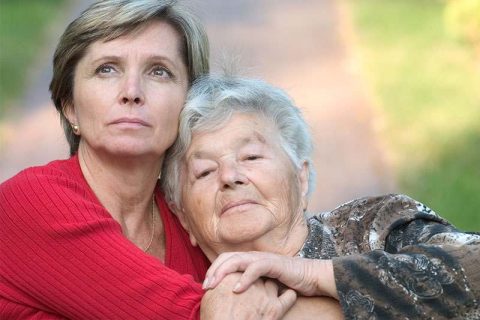September 10, 2024 by

If your mom has dementia and is struggling to remember your name or losing track of her daily routine, an unsettling thought might creep into your mind: “Will this happen to me, too?” It’s natural to struggle with the fear of facing the same challenges as a loved one with dementia. We invite you to take a deep breath and consider the following facts, causes, and risk factors about dementia and Alzheimer’s disease to help empower you to navigate these worries and find some peace of mind.
Genetic Factors and Family History
One of the first things to consider is the role of genetics. Alzheimer’s disease, the most common form of dementia, has a hereditary component. According to the National Institute on Aging (NIA), individuals with a family history of Alzheimer’s are at a higher risk of developing the disease themselves. However, it’s important to note that having a parent with Alzheimer’s does not guarantee that you will get it too.
Types of Alzheimer’s Disease
There are two types of Alzheimer’s disease: early-onset and late-onset. Early-onset Alzheimer’s, which appears between the ages of 30 and 60, can sometimes be attributed to specific genetic mutations. These mutations are relatively rare and are usually passed directly from one generation to the next.
Late-onset Alzheimer’s, which occurs after the age of 60, is more common and has a less clear genetic link. While genetics do play a role, other factors such as environment and lifestyle are also significant contributors. Researchers are still exploring the complex interplay of these factors, but it’s understood that having a parent or sibling with Alzheimer’s slightly increases your risk.
Environmental and Lifestyle Factors
While you cannot change your genetics, you can influence your environment and lifestyle. The same healthy habits that are good for your heart are also beneficial for your brain. Engaging in regular physical activity, eating a balanced diet rich in fruits, vegetables, and whole grains, and avoiding smoking can all reduce your risk.
Additionally, staying mentally and socially active is also crucial. Activities that challenge your brain, such as puzzles, reading, or learning new skills, can help build cognitive reserve. Social interactions and maintaining strong relationships contribute to brain health, so keeping your mind engaged and active can potentially delay the onset of dementia symptoms.
Monitoring and Preventive Measures
Being proactive about your health can also provide peace of mind. Regular check-ups with your doctor can help monitor your cognitive health. If you have concerns about your memory or other cognitive functions, discussing these with your healthcare provider can lead to early detection and intervention.
You may also want to consider genetic testing to determine your risk. While this can provide some information, it’s essential to approach it with caution. Knowing your genetic predisposition can be a double-edged sword, as it can cause unnecessary anxiety. It’s important to discuss the potential benefits and drawbacks with a genetic counselor or your healthcare provider before proceeding.
Support and Resources
If you’re caring for a loved one with dementia, remember that you are not alone. Support groups, counseling, and educational programs can provide valuable information and emotional support. Taking care of your own mental and emotional health is just as important as caring for your loved one.
At Home Independent Living is here to help as well with a comprehensive library of resources to educate you and your family about Alzheimer’s and other types of dementia. We also provide specialized dementia care services by highly trained, experienced, and skilled care professionals. Contact us at (315) 579-HOME (4663) any time to learn more about how we can help both you and your family member with dementia in Syracuse, Camillus, Clay, and the surrounding areas in Central New York.
